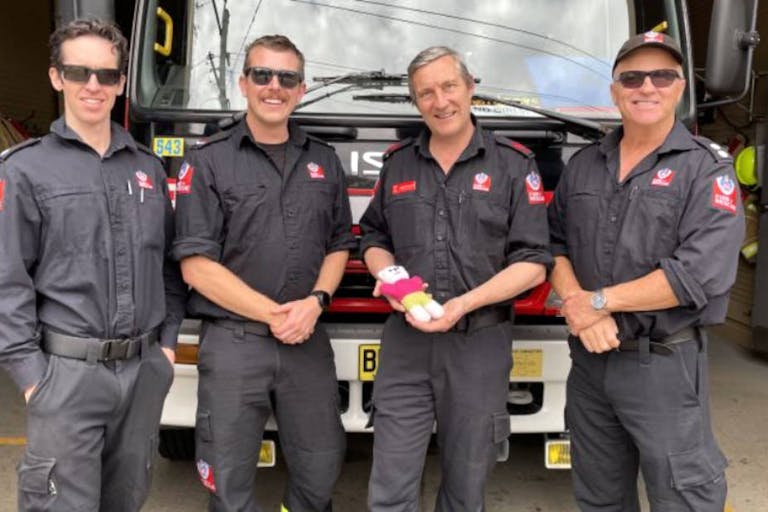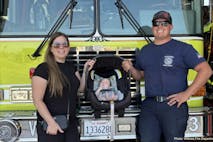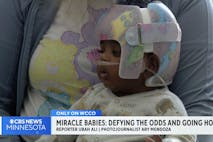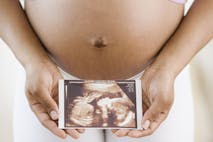BUNDANOON | Firefighters help deliver premature baby in southern highlands hotel room. A Fire and Rescue NSW (FRNSW) crew has come to the rescue of a woman, giving birth three weeks early in a hotel at Bundanoon, in the state’s Southern Highland... fire.nsw.gov.au/incident.php?r…

‘Prepared for anything’: Firefighters help deliver preemie in hotel room
Human Interest·By Laura Nicole
‘Prepared for anything’: Firefighters help deliver preemie in hotel room
Fire and Rescue New South Wales (FRNSW) is, according to their motto, “Prepared for anything,” but some days that “anything” is a little more exciting than others.
The FRNSW team in the town of Bundanoon, New South Wales, responded to an emergency call to an area hotel. A mother was in intense labor with her baby, and she was about three weeks before her expected due date.
The Fire and Rescue station dispatched a four-person team to respond to the call, including Firefighter Roberto Gnecchi-Ruscone. According to a statement by FRNSW, Gnecchi-Ruscone had completed a refresher course in pediatric assessment just three days prior, and was already trained in medical assistance as a first responder. “Roberto (the CFR-trained member) and his firefighting colleagues embodied FRNSW’s motto, ‘Prepared for Anything’ and raced into action,” the statement read.
For safety, Roberto also took advantage of a first responders’ app where he could access the advice of dedicated paramedics live.
When they reached the hotel, the first responders went upstairs where a number of hotel staff were doing their best to support the mother, Agum, through her contractions which, at one minute apart, were already in their final stages. Within minutes of the firefighters’ arrival, a baby girl, Deborah, was born. The firefighters gave Deborah to her mother, and the pair were assessed by the newly-arrived ambulance paramedics before being transported to the hospital.
Article continues below
Dear Reader,
In 2026, Live Action is heading straight where the battle is fiercest: college campuses.
We have a bold initiative to establish 100 Live Action campus chapters within the next year, and your partnership will make it a success!
Your support today will help train and equip young leaders, bring Live Action’s educational content into academic environments, host on-campus events and debates, and empower students to challenge the pro-abortion status quo with truth and compassion.
Invest in pro-life grassroots outreach and cultural formation with your DOUBLED year-end gift!
According to reports, both mother and baby are in good condition. FRNSW gave baby Deborah a teddy bear to remember the momentous, chaotic occasion.
The heroic FRNSW hotel delivery comes as many parts of Australia are facing a shortage in maternity care, especially in rural parts of the country. A shortfall of specialists, pressure on medical professionals and hospitals due to lingering effects of the COVID-19 pandemic, and shifting local demographics have all contributed to the closure of maternity wards. Where these wards have closed, hospitals have remained on bypass for months, redirecting women to other locations between one and four hours away.
A lack of availability of care has resulted in more anecdotes of roadside births and other unplanned, out-of-hospital deliveries similar to Deborah’s.
Ged Kearney, Assistant Health Minister, told ABC that the Australian government is looking at ways to remedy the staffing shortages. “We need to make sure there is a robust workforce – that enough people are going into midwifery, that they can have fulfilling careers and work to their full scope of practice,” she said.
The crisis in maternity care in Australia mirrors the debate about “maternity care deserts” in less populous regions of the United States. The mainstream U.S. media has blamed these gaps in maternity care on pro-life laws in some states, as Live Action has reported, but Australia’s problems with maternity care take place in a country where abortion is legal and most states permit it up to 22 weeks. Thus, while abortion advocates have suggested increased access to abortion is a panacea for maternity care access, Australia’s example seems to be yet more evidence of the hollowness of this claim.
Live Action News is pro-life news and commentary from a pro-life perspective.
Contact editor@liveaction.org for questions, corrections, or if you are seeking permission to reprint any Live Action News content.
Guest Articles: To submit a guest article to Live Action News, email editor@liveaction.org with an attached Word document of 800-1000 words. Please also attach any photos relevant to your submission if applicable. If your submission is accepted for publication, you will be notified within three weeks. Guest articles are not compensated (see our Open License Agreement). Thank you for your interest in Live Action News!
Read Next

An unwanted abortion at age 18 sent Remy into a deep depression until she found healing
Sheena Rodriguez
·More In Human Interest

Human Interest
An unwanted abortion at age 18 sent Remy into a deep depression until she found healing
Sheena Rodriguez
·
Human Interest
Baby born via emergency C-section to save her and her mother
Angeline Tan
·
Human Interest
A pro-life sign saved this little girl's life from abortion
Andrea Trudden
·
Human Interest
She was told to abort her baby and try again. But his diagnosis did not diminish his value
Lisa Bast
·
Human Interest
NICU babies are adorable in their 'ugly Christmas sweaters'
Nancy Flanders
·More From Laura Nicole

Human Interest
California fire captain reunited with preemie he helped to save
Laura Nicole
·
Human Interest
Quintuplet born weighing just 8 ounces is home to celebrate his birthday
Laura Nicole
·
Newsbreak
Philadelphia tests program to reduce infant mortality, giving pregnant moms $1000 monthly
Laura Nicole
·
Human Interest
High school football player with Down syndrome goes viral
Laura Nicole
·
Human Interest
Miracle preemie born weighing a pound at birth goes home after a two-month NICU stay
Laura Nicole
·